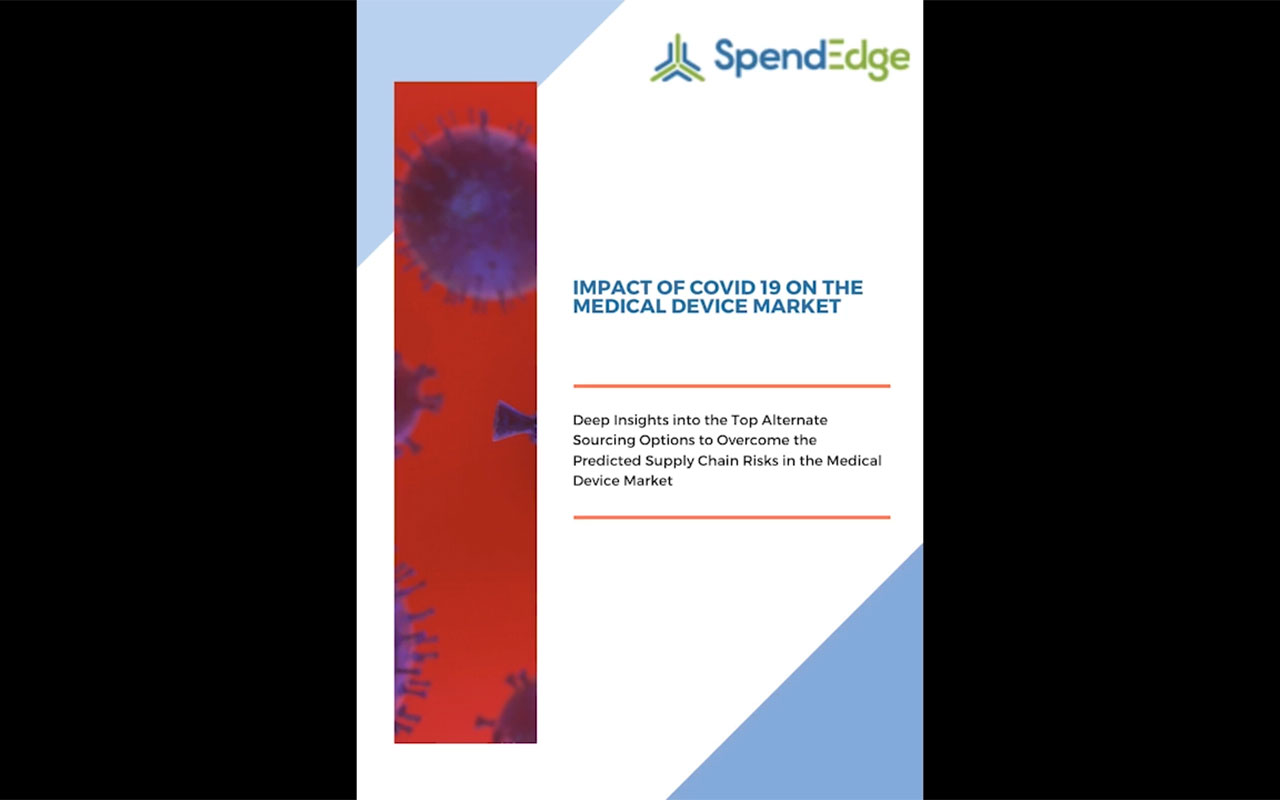LONDON--(BUSINESS WIRE)--In the wake of the impact of COVID 19 on the industrial scenario, SpendEdge, a global procurement market intelligence firm, has announced the release of its whitepaper that enlists the alternate sourcing strategies to address the supply chain risks in the medical device market.
Get your free access to our digital procurement platform to see how SpendEdge can help you with your alternate sourcing objectives to address the impact of COVID 19 on the medical device market.
Supply chain disruption is perceived as the most aggravating impact of COVID 19 on the medical device market. While buyers are struggling to sustain their business continuity in a highly uncertain market scenario, the impact of COVID 19 is reinstating the importance of leveraging alternate sourcing strategies to restore harmony in their supply chain management during hours of an emergency.
What are the emerging risks triggered by the impact of COVID 19 on the medical device market
Supply Bottlenecks
Countries in APAC, China, in particular, are among the highly favored sourcing destinations for enterprises in the medical device market. China houses some of the major manufacturing hubs of critical medical equipment. However, the eventual shutdown of these manufacturing facilities to contain the impact of COVID 19 in China is resulting in severe supply bottlenecks for enterprises in the medical device market. This is resulting in production down-time that is ultimately taking its toll on the scopes of revenue generation for these enterprises.
A decline in the supply of lithium battery
China is also home to major lithium producing companies. The lithium battery is an essential component used in the building of a range of critical medical equipment such as wearable oxygen monitor, sphygmomanometer, and other medical devices. For the lithium producing companies in China, the impact of COVID 19 will take the form of major challenges such as limited supply channels, exorbitant transportation fees, production costs, liquidity problems, among others. These challenges will either restrict the supply of lithium or will compel them to increase the market prices of their battery-grade lithium.
Request a free demo of our procurement platform to know how alternate sourcing measures will help you tackle supply chain risks caused by the impact of COVID 19 in the medical device market.
How is Alternate Sourcing an Answer to the Imposing Challenges Triggered by the Impact of COVID 19 on the Medical Device Market?
Engage with suppliers for inventory planning of spare parts and products
Considering the current impact of COVID 19 on the medical device market, a critical alternate sourcing objective for buyers is to engage with suppliers who can assist in efficient demand and inventory planning of spare parts and products. It will help to overcome expenses associated with the excess holding of products. It primarily ensures the adequate availability of spare parts and products during emergencies.
Engage with suppliers who can meet demand variations
The current pandemic situation is creating the necessity of ad hoc procurement of medical components. During these instances, engagement with suppliers will prove beneficial who have sufficient spare production capacity to meet any ad hoc variations in product demand. This will, in turn, enable buyers to reduce procurement time in such cases, that would otherwise be required for selecting a new supplier and check adherence of its products to quality and regulatory norms.
Prefer suppliers based on their logistics capabilities
Buyers must choose suppliers who have the necessary logistics capabilities to ensure an uninterrupted supply of medical components to their facilities. The criticality of these equipment in the functioning of buyer's facilities requires on-time and uninterrupted delivery. This necessitates engagement with suppliers who have adequate logistics facilities. Buyers should also choose suppliers who have associations with well-established logistics partners capable of carrying out the delivery on behalf of suppliers.
Request a free demo of our digital procurement platform to know more about our alternate sourcing solutions that can help your procurement team address challenges posed by the impact of COVID-19 on the medical device market.
You may also like:
- Has the Corona Virus Pandemic Called for a Re-course of Your Business Perspective? –Quick Insights into Risk Mitigation Measures Imperative at This Moment
- Is the global pharmaceutical industry held hostage by the deadly Coronavirus? SpendEdge’s Tridib Bora offers insightful answers to this imposing query
About SpendEdge:
SpendEdge shares your passion for driving sourcing and procurement excellence. We are the preferred procurement market intelligence partner for 120+ Fortune 500 firms and other leading companies across numerous industries. Our strength lies in delivering robust, real-time procurement market intelligence reports and solutions. To know more, https://www.spendedge.com/request-free-proposal



